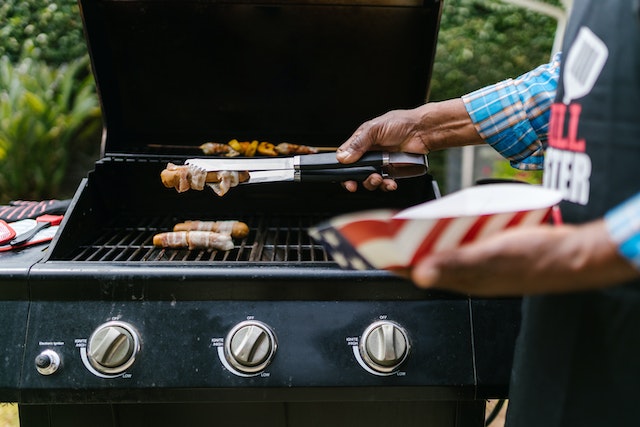
Liquid Propane Vs Natural Gas Grill: How to Choose the Right Fuel for Grilling
If you’re in the market for a new grill, it’s important to decide which fuel type is right for you. Liquid propane vs natural gas grills both have their pros and cons, so it can be tricky to decide which one is best for your needs. In this blog post, we’ll break down the differences between liquid propane and natural gas grills so you can make an informed decision when purchasing your next grill.
Table of Contents
What Is Liquid Propane Grill?
Liquid propane grills use gas to cook food. They are easy to use and offer many benefits over traditional grilling methods. Liquid propane grills cook food faster and at a higher temperature than charcoal grills, so they are ideal for cooking large cuts of meat or multiple items at once. Liquid propane grills are also easier to clean than charcoal grills.
Liquid propane (LP) is a hydrocarbon gas that is liquefied through pressurization. It is odorless, colorless, and non-toxic. LP is commonly used as a fuel for BBQ grills because it burns hotter and cleaner than other fossil fuels like natural gas or propane.
The main benefit of using an LP grill is that it offers a consistent cooking temperature. This is due to the fact that the gas is under pressure, which prevents it from cooling down too quickly. As a result, you can cook your food evenly without having to worry about flare-ups or hot spots.
LP grills also tend to be more affordable than other types of grills. If you are looking for a budget-friendly option, an LP grill is a good choice.
Another advantage of liquid propane grills is that they are easy to set up and use. Unlike charcoal grills, you don’t need to light a fire or wait for the coals to heat up before you start cooking. All you need to do is turn on the gas and start cooking.
If you are looking for a grill that is easy to use and offers consistent results, a liquid propane grill is a good option. However, there are a few things to keep in mind before you purchase one.
First, make sure that the grill you choose has enough BTUs (British Thermal Units) to meet your needs. The higher the BTU rating, the hotter the grill will be. If you plan on cooking for large groups or entertaining, you will need a grill with a higher BTU rating.
Second, consider the size of the grill. If you have a small patio or deck, you may not need a large grill. However, if you have a large outdoor area, you will want to choose a grill that can accommodate your cooking needs.
Finally, think about the features you want in a grill. Some grills come with side burners, rotisseries, and other accessories. Choose the features that are important to you and that will make your grilling experience more enjoyable.
Now that you know what to look for in a liquid propane grill, it’s time to start shopping. There are many different brands and models to choose from, so take your time and find the perfect one for your needs. With so many options available, you are sure to find the perfect grill for your next cookout.
What Is Natural Gas Grill?
Natural gas grills are a type of grill that uses natural gas as its fuel source. Natural gas is an inexpensive, clean-burning fuel that is typically supplied by a local utility company. Natural gas grills are convenient because they do not require the use of charcoal or propane, and they can be easily hooked up to your home’s natural gas line.
Natural gas grills come in a variety of sizes and styles to suit your grilling needs. Smaller models are perfect for tailgating or camping, while larger models can accommodate a full-sized party. Whether you’re looking for a simple model to cook hot dogs and hamburgers or a sophisticated grill with all the bells and whistles, there’s a natural gas grill to suit your needs.
If you’re considering switching to a natural gas grill, there are a few things to keep in mind. First, be sure to check with your local utility company to see if there are any restrictions on using natural gas grills in your area. Some areas may require special permits or licenses. Second, be sure to read the manufacturer’s instructions carefully before assembling or using your grill. This will help you avoid any accidents or injuries. Finally, always follow the safety tips listed below when using any type of grill.
Liquid Propane Vs Natural Gas Grill Comparison
Looking to purchase a new grill, but unsure of which fuel type to choose? In this article, we’ll compare liquid propane and natural gas grills in a number of key categories, to help you make an informed decision.
Availability: Liquid propane is widely available at hardware and home stores, making it a convenient option for most grillers. Natural gas, on the other hand, may not be available in all areas.
Cost of Gas: Liquid propane typically costs more than natural gas. However, it’s worth noting that the price of propane can fluctuate due to supply and demand factors.
Energy Efficiency: When it comes to energy efficiency, natural gas wins hands down. Natural gas is burned more completely than liquid propane, resulting in less wasted heat.
Convenience: For many people, liquid propane is the more convenient option. That’s because you can easily take a propane tank with you when you travel, so you’re never far from your grill. Natural gas, on the other hand, needs to be hooked up to a permanent line.
Easy on Your Pocket(liquid propane vs natural gas grill): If you’re looking to save money, natural gas is usually the cheaper option in the long run. However, it does require a initial investment to hook up to a natural gas line.
Environmental Impact: When it comes to environmental impact, there’s not much difference between the two types of grills. Both use fossil fuels, so they will have a similar carbon footprint.
Portability: If you’re looking for a grill you can take with you on the go, liquid propane is your best bet. Natural gas grills are usually stationary, as they need to be hooked up to a permanent line.
Safety: Both liquid propane and natural gas are safe to use, as long as you follow the manufacturer’s instructions. However, there is a slight risk of explosion with propane grills, so it’s important to always use caution.
Setup Costs: The initial investment for a natural gas grill is usually higher than for a liquid propane grill. That’s because you need to have a natural gas line installed in your home. However, once the line is installed, natural gas grills are typically cheaper to operate in the long run.
So, which type of grill is right for you? Ultimately, the decision comes down to personal preference and your unique needs. Consider the factors that are most important to you, and make your choice based on that.
FAQs About Liquid Propane Vs Natural Gas Grill
How Does A Liquid Propane Grill Work?
Liquid propane grills work by using LPG as fuel. The LPG is stored in cylinders or tanks and is used to cook food on the grill. The heat from the flames cooks the food, and the smoke from the fire adds flavor to the food.
What Are The Benefits Of Using A Liquid Propane Grill?
Liquid propane grills are a popular choice for grilling because they are easy to use and can be stored easily. They are also less expensive than other types of grills, such as gas or charcoal grills. Additionally, liquid propane grills provide consistent heat, which is important for cooking food evenly.
How Do I Care For My Liquid Propane Grill?
To care for your liquid propane grill, it is important to clean it regularly. This includes removing any food or grease build-up from the grates and surfaces. Additionally, it is important to inspect the gas lines and connections regularly to ensure that they are not leaking. It is also a good idea to cover your grill when it is not in use to protect it from the elements.
What Are Some Safety Tips For Using A Liquid Propane Grill?
Some safety tips for using a liquid propane grill include never leaving the grill unattended while it is lit, and making sure that the grill is turned off completely before leaving it. Additionally, it is important to keep children and pets away from the grill while it is in use. Additionally, it is important to read the manufacturer’s instructions carefully before using the grill.
Can I Use My Liquid Propane Grill Indoors?
No, liquid propane grills should only be used outdoors. Using a liquid propane grill indoors can pose a serious fire hazard.
What Are Some Common Problems With Liquid Propane Grills?
Some common problems with liquid propane grills include leaks in the gas lines, clogged burners, and igniter problems. Additionally, it is important to make sure that the grill is properly vented before using it. Otherwise, dangerous gases can build up and cause an explosion.
How Much Does A Liquid Propane Grill Cost?
Liquid propane grills typically range in price from $100 to $500. The price depends on the size and features of the grill.
How Do Natural Gas Grills Work?
Natural gas grills work by igniting a flame within the grill’s burner(s) using a spark ignition system. The flame is then used to heat up the grill’s cook surface, which can be made of cast iron, stainless steel, or porcelain-coated steel. The food is placed on the cook surface and cooked to perfection!
What Are The Benefits Of Using A Natural Gas Grill?
There are many benefits of using a natural gas grill, including the following:
– Natural gas is a clean-burning fuel source that produces less emissions than charcoal or propane grills.
– Natural gas grills are typically less expensive to operate than their charcoal or propane counterparts.
– Natural gas grills offer consistent cooking performance and temperature control.
– Many natural gas grills come with built-in features such as side burners and rotisseries that further enhance their cooking capabilities.
How Do I Choose The Right Natural Gas Grill For Me?
When choosing a natural gas grill, there are several factors to consider, including the following:
– Size: Natural gas grills come in a variety of sizes to accommodate different cooking needs. Choose a grill that is large enough to accommodate the amount of food you typically cook.
– Features: As mentioned above, many natural gas grills come with built-in features such as side burners and rotisseries. Consider which features would be most useful for your cooking needs.
– Budget: Natural gas grills range in price from around $100 to $1,000 or more. Determine how much you are willing to spend on a grill before beginning your search.
How Do I Care For My Natural Gas Grill?
Caring for your natural gas grill is important to extend its lifespan and keep it functioning properly. Be sure to do the following:
– Cover your grill when not in use to protect it from the elements.
– Clean your grill regularly, including the cook surface, burners, and flavorizer bars (if applicable).
– Inspect your grill before each use to ensure that all parts are functioning properly.
– Store your natural gas tank in a cool, dry place when not in use.
– Consult your grill’s owner’s manual for specific care and maintenance instructions.
Can I Use My Liquid Propane Grill If There Is A Gas Leak?
No, you should not use your liquid propane grill if there is a gas leak. This could cause an explosion or fire. If you smell gas, turn off the valve on the tank and call your local fire department or gas company immediately.
>>> See more: Cooking with Natural Gas – Backyard Barbecue(liquid propane vs natural gas grill)
Conclusion
So, how do you choose the right fuel for your grill? Liquid propane vs natural gas grill? It depends on what you’re cooking and where you live. If you want to cook a lot of different things on your grill, or if you live in an area with changing weather conditions, then liquid propane is the way to go. But if all you want to do is cook burgers and dogs most of the time, then natural gas might be a better option for you. No matter which fuel type you choose, we hope these tips have helped make your grilling experience even better. Now get outside and start cooking!
Read more:



